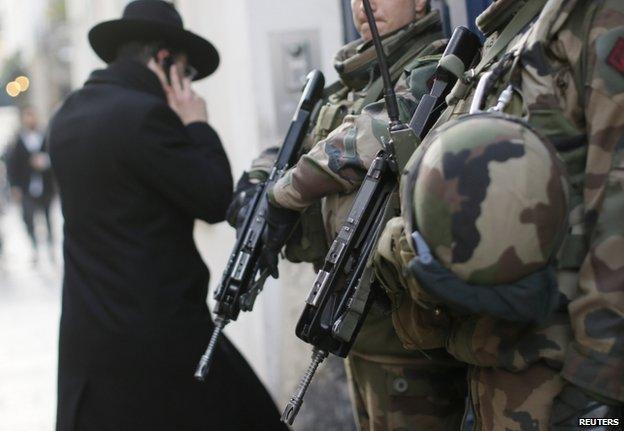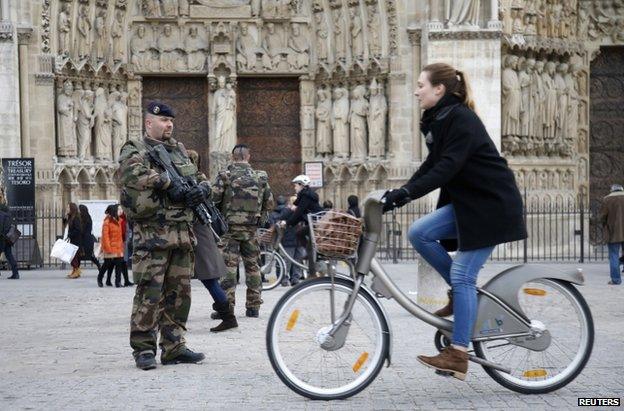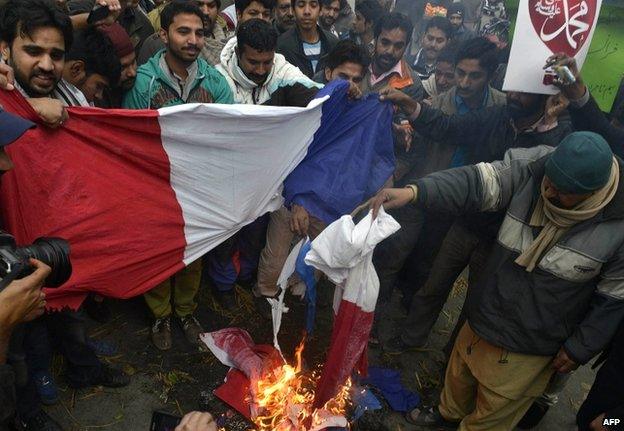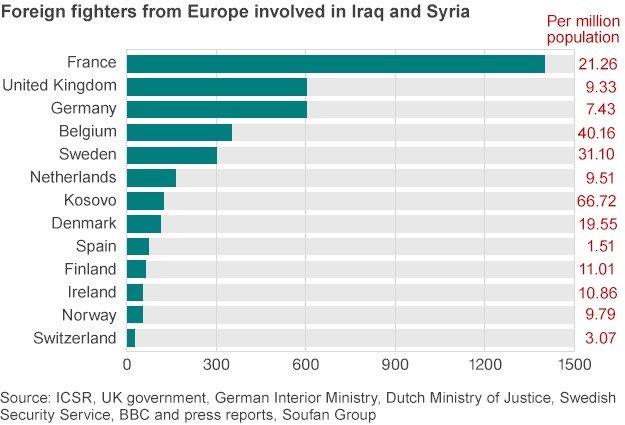Paris attacks: France to recruit more police agents
- Published
Prime Minister Manuel Valls: "This effort... is a massive one"
Hundreds of new police intelligence agents will be recruited in France, and some defence cuts will be reversed, after the Islamist attacks in Paris.
Prime Minister Manuel Valls said 2,680 new security-related jobs would be created, including 1,100 in police intelligence, over three years.
Mr Valls pledged an extra €425m (£325m; $490m) in funds, saying 3,000 people were under surveillance in France.
In addition, 7,500 defence jobs due to be cut will now be saved.
France had been planning to cut 25,800 defence posts over five years. The partial reversal was announced by President Francois Hollande.
On 7 January, gunmen attacked the Paris offices of satirical magazine Charlie Hebdo, killing 12 people including several famous French cartoonists. They allegedly shouted they were "avenging" cartoons of the Prophet Muhammad.
A third gunman, Amedy Coulibaly, is believed to have shot dead a policewoman near Paris on 8 January before killing four people at a Jewish supermarket in the city a day later.
Four men have been arrested in the Paris region over the Coulibaly attacks and charged with conspiracy to commit terrorist acts.
European Vice-President Frans Timmermans has said Europe faces a "huge challenge" to reassure Jews about their future in Europe.
"Today we see that in some of our member states the majority of the Jewish community is not sure that they have a future in Europe," he told reporters in Brussels. "And I think this is a huge challenge to the very foundations of European integration."

Troops have been deployed to protect Jewish areas in Paris

Soldiers could be seen outside Notre Dame cathedral in Paris this week
In other developments:
Belgian police made a fourth arrest over an alleged Islamist militant plot to attack police
In Moscow, Russian Foreign Minister Sergei Lavrov said Russia would continue to work with the West to fight terrorism despite tensions over the conflict in Ukraine, the AP news agency reports
Angry protests over the Charlie Hebdo cartoons continued in the Islamic world on Wednesday when traders in the Pakistani city of Lahore burnt French flags
'Relentless fight'
Mr Valls said security forces would be provided with better weapons and protection, including bullet-proof vests.
"We will pursue this fight against terrorism relentlessly," he said.
The new jobs will be created over a period of three years. Some 1,400 will be created through the interior ministry, mostly in counter-terrorism intelligence, with other posts to be opened at the ministries of justice, defence and finance.

Analysis: Hugh Schofield, BBC News, Paris
The security service reinforcements are a recognition that France's intelligence-gathering - normally held up as a paragon in Europe - has fallen behind the times. New officers are needed but also new equipment, and new methods.
Manuel Valls said nearly 3,000 individuals needed to be monitored today. Nearly half of these are people who have been or are planning to go to Syria and Iraq to join Islamic State. The others are from older radicalised networks. One lesson of the Kouachi-Coulibaly attacks is that these older networks cannot be neglected.
Intelligence experts in France say it takes 20 officers on the ground to provide round-the-clock monitoring of a suspect. Obviously this is impossible for 3,000 individuals.
Recruiting more men and women for gumshoe work will help. But the higher priority is for analysts: people who can make sense of masses of accumulated electronic information.

The French prime minister also stressed the threat resulting from people travelling to fight in Syria and Iraq.
"One thing is certain," he said. "The number of people who are radicalised and capable of carrying out attacks on our soil hasn't stopped increasing."
Of those who the authorities need to monitor, Mr Valls said there were now nearly 1,300 people residing in France and suspected of links to networks active in Syria and Iraq - a number that had increased by 130% in a year.
There were, he said, another 400-500 people suspected of links to older extremist networks and others who were active in the francophone "cyber-jihadist" sphere.
Mr Valls announced a series of other measures, including:
Sixty extra Muslim clerics to be recruited to work in prisons, in addition to the 182 already employed
Special sections in prisons for extremist detainees
An internet site to inform the public about ways of preventing youth radicalisation

The Pakistani city of Lahore saw a rally by traders on Wednesday at which French flags were burnt in protest at Charlie Hebdo cartoons of the Prophet Muhammad
France has deployed more than 10,000 troops across the country to protect public spaces and sensitive sites such as schools, synagogues and mosques.
Authorities in several European countries apprehended terrorist suspects following the Paris attacks. In Belgium, two men alleged to have been planning an attack against the police were shot dead in an anti-terror raid last week.
